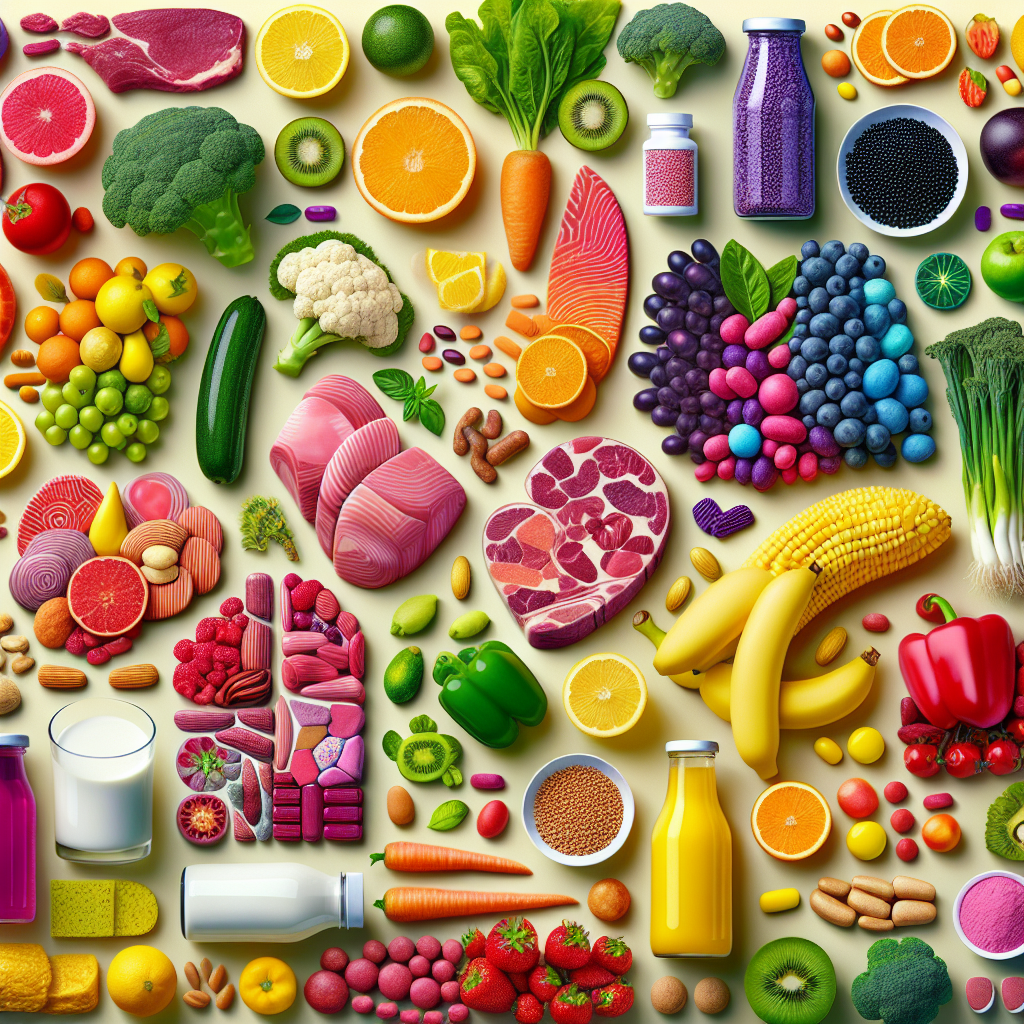Know Your Vitamins: Which Isn’t Fat-soluble?
In the realm of health and wellness, understanding the distinctions between different classes of vitamins can be critical to maintaining a balanced and nourishing diet. “Know Your Vitamins: Which Isn’t Fat-Soluble?” provides a comprehensive guide that imparts fascinating insights about an array of vitamins that our bodies require, with express focus on discerning which vitamins are not fat-soluble. From discerning the physical appearance of pounds of body fat to the healthiest fats Ismael can use to cook chicken, the article explores diverse topics that underscore the importance of knowledge about fat-solubility within the broader context of health and nutrition.

Understanding Vitamins
Definition and Key Functions of Vitamins
Vitamins are organic compounds essential to the body for growth, reproduction, and maintenance of good health. These micronutrients, which humans must obtain through diet, serve a range of functions. They are crucial for energy production, immune function, blood clotting, and numerous other body processes. Vitamins also serve as antioxidants, which can protect cells from potential damage caused by harmful substances known as free radicals.
The Two Categories of Vitamins: Fat-Soluble and Water-Soluble
It is essential to note that vitamins fall into two categories: fat-soluble and water-soluble. The classification refers to how they are absorbed, stored, and excreted in the body. This distinction significantly impacts how the body uses these nutrients and its response to their excess or deficiency.
Overview of Fat-Soluble Vitamins
Characteristic Features and Properties of Fat-Soluble Vitamins
fat-soluble vitamins, as their name suggests, dissolve in fat. Unlike their water-soluble counterparts, excess fat-soluble vitamins are stored in the liver and fatty tissues for future use – instead of being excreted in urine. This characteristic creates the potential for toxicity when these vitamins are consumed in large amounts.
The Four Types of Fat-Soluble Vitamins
The four types of fat-soluble vitamins are Vitamins A, D, E, and K. Each vitamin serves a unique role in the body; Vitamin A is vital for vision and immune function; Vitamin D is crucial for calcium absorption and bone health; Vitamin E acts as an antioxidant and assists in immune function; and Vitamin K is necessary for blood clotting and bone health.
Importance and Functions of Fat-Soluble Vitamins
The presence and adequate intake of fat-soluble vitamins are vital for effective functioning of various body systems. They support vision, contribute to cell growth, aid in mineral absorption, provide protection from damage to cells and tissues, facilitate the formation of blood clotting proteins, and support overall physiological stability.
Comparison of Fat-Soluble and Water-Soluble Vitamins
Differences in Absorption, Storage, and Excretion Between the Two Types
There are significant differences in how fat-soluble and water-soluble vitamins are processed in the body. Fat-soluble vitamins are absorbed along with fats in the diet and can be stored in the body’s fatty tissue. In contrast, water-soluble vitamins are not stored in the body; they are eliminated in urine, necessitating a more frequent intake.
Comparison of Nutritional Roles in the Body
Both types of vitamins play crucial roles in bodily functions, but their specific roles differ. As previously mentioned, fat-soluble vitamins (A, D, E, and K) are vital for vision, bone health, and cell protection. On the other hand, water-soluble vitamins like the B-complex vitamins and Vitamin C play vital roles in the conversion of food into energy, collagen production, wound healing, iron absorption, and other metabolic activities.
The Impact of Cooking on Fat-Soluble and Water-Soluble Vitamins
The method and duration of food preparation can affect vitamin content due to their different stability. Water-soluble vitamins are more vulnerable to destruction from heat, light, and air, so boiling or overcooking food can degrade these nutrients. Whereas, fat-soluble vitamins are more resistant to heat and can be better preserved through cooking.

Detailed Look at Water-Soluble Vitamins
Features and Properties of Water-Soluble Vitamins
Water-soluble vitamins include the eight B vitamins and vitamin C. These are not stored in the body and need to be consumed daily, as they dissolve in water and are excreted in urine. Intake above what the body needs is not harmful, as excess is regularly removed, reducing the risk of toxicity.
Types of Water-Soluble Vitamins
The eight B vitamins (B1, B2, B3, B5, B6, B7, B9, B12) constitute the B-complex group, and they are critical for the conversion of food into energy, nerve function, and the formation of red blood cells. Vitamin C or ascorbic acid has distinct roles, such as immune support, protection against oxidative stress, and aiding in collagen synthesis.
Importance and Functions of Water-Soluble Vitamins
Water-soluble vitamins contribute to a diverse range of critical functions. They support metabolism, cell function, immune system efficiency, collagen production, tissue repair, and preventative health through their antioxidant properties.
Which Vitamin is Not Fat-Soluble?
Identifying Non Fat-Soluble Vitamins
Water-soluble vitamins, including all the B vitamins and vitamin C, are not fat-soluble. They are quickly absorbed into the bloodstream and readily excreted skin through urine, with little storage in the body.
Understanding Their Solubility and Absorption Mechanism
Water-soluble vitamins are absorbed directly into the bloodstream during digestion, while fat-soluble vitamins are initially absorbed into lymphatic system, then the bloodstream. The kidney plays a significant role in regulating water-soluble vitamin retention, considering their high rate of excretion.
Effects of Over and Under Consumption of Vitamins
Examine the Health Risks of Excess Fat-Soluble Vitamin Intake
While it is uncommon, consuming excessive amounts of fat-soluble vitamins, especially vitamins A and D, can be harmful. Since they can be stored in the body, their accumulation can lead to toxicity, causing symptoms like bone pain, dizziness, nausea, and even hair loss.
Signs and Consequences of Vitamin Deficiencies
Vitamin deficiencies can lead to a number of health problems. For instance, deficiency in Vitamin D can result in bone and muscle weakness, while lack of Vitamin A can lead to vision problems. Other symptoms include fatigue, shortness of breath, dizziness, muscle weakness, and mood changes.
Understanding the Impact of Body Fat Levels on Vitamin Absorption
Differing body fat levels can affect how much fat-soluble vitamins are absorbed and stored. higher levels of body fat may increase the amounts of fat-soluble vitamins the body can store. However, it’s essential to understand that high fat levels can have other health effects, both positive and negative.
The Relation Between Vitamins and Body Fat
How Body Fat Levels can Impact Vitamin Absorption and Storage
Body fat levels influence the absorption and storage of fat-soluble vitamins. People with higher levels of body fat may be able to store more of these types of vitamins. However, excessive body fat can interfere with the absorption of certain vitamins, reducing their effectiveness.
The Role of Healthy Body Fat Ranges in Vitamin Efficiency
Having a healthy body fat percentage contributes to more efficient absorption and use of both fat-soluble and water-soluble vitamins. Proper intake and absorption of these vitamins support overall bodily functions and prevent potential health complications.
Importance of Balanced Vitamin Intake
The Nutritional Requirement for Each Type of Vitamin
Each vitamin has a specific recommended dietary allowance or intake defined. A balanced intake ensures that the body gets the necessary amounts of each vitamin for efficient functioning. Consuming a variety of foods from all food groups can help achieve this nutritional balance.
How to Ensure a Balanced Vitamin Intake Through Dietary Choices
A healthy, varied diet is the best way to get a balance of vitamins. Fruits, vegetables, lean meats, grains, and dairy products all contribute unique combinations of vitamins to one’s diet. These foods provide a natural, balanced mix of vitamins, leading to better overall health outcomes.
Prevention and Management of Vitamin Deficiencies
Common Foods Rich in Different Vitamins
Incorporating a variety of foods into your diet is a practical approach to ensure sufficient vitamin intake. Fruits, vegetables, lean meats, fish, whole grains, and dairy are rich in essential vitamins. For instance, citrus fruits are high in Vitamin C, leafy greens are packed with Vitamins A, C, and K, and dairy products are a solid source of Vitamins A and D.
How to Manage a Vitamin Deficiency
If a deficiency is identified, increasing the intake of foods rich in the required vitamin is usually the first step. In certain cases, a healthcare provider may recommend supplements to manage the deficiency effectively.
Role of Supplements in Managing Vitamin Intake
While a balanced diet is the best source of vitamins, supplements can play a supporting role in maintaining healthy vitamin levels. However, supplements should only be consumed under the guidance of a healthcare provider, especially when dealing with fat-soluble vitamins, due to their potential for toxicity.
Conclusion: Role of Vitamins in Overall Health
Summarizing the Role and Importance of Each Type of Vitamin
Each vitamin, whether fat-soluble or water-soluble, plays a vital role in maintaining the body’s overarching health and functionality. They contribute to everything from the energy the body uses to function, to vision, to the constant defense against potential sources of harm, making them indispensable components of the human diet.
The Ideal Vitamin Balance for a Healthy Lifestyle
The key to a healthy lifestyle lies in maintaining a balance. Ensuring a balanced intake of both fat-soluble and water-soluble vitamins through diet or supplements when needed, can support overall health and prevent deficiencies or excesses.
Discussion on the Misconceptions About Fat-Soluble and Water-Soluble Vitamins
Despite common misconceptions, neither category of vitamins holds superiority over the other. They are equally vital, serving different, yet harmonizing functions in the body. Understanding this can guide dietary habits and choices to fulfill the body’s nutrient needs adequately, contributing to its overall well-being.

